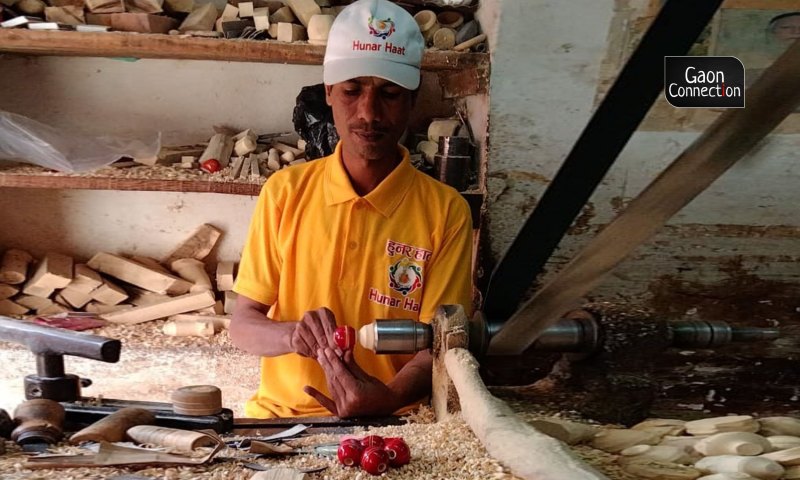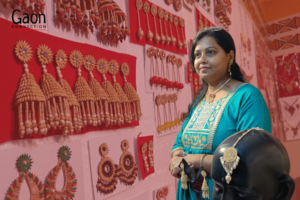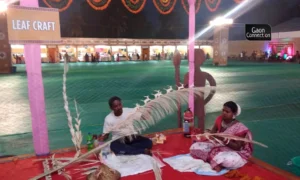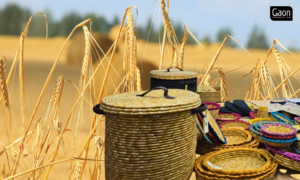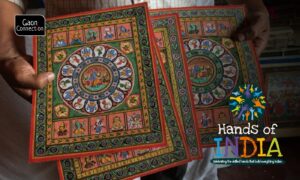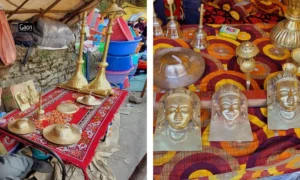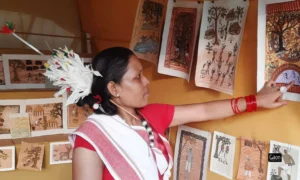Forty-one-year old Javed Sayyed has been making Channapatna wooden toys for more than 20 years now. “My father Sayyed Mian taught me the rudimentary skills and after a while I attended courses to hone my skills and modernise the toys,” the toy maker said. Javed lives with his family in Channapatna, which falls in Ramanagara district, about 60 kilometres from Bengaluru in Karnataka. He makes nearly two to three hundred different kinds of toys, jars, decorative items with wood and non-toxic colours.
Channapatna is also fondly called Gombegala Ooru, or a city of toys. And all those old enough to recollect journeys between Bengaluru and Mysore, when the train halted for a few minutes at the small station, will remember the almost unbearable anticipation of buying colourful wooden kitchen sets, skipping ropes, spinning tops that came packed in baskets. If a kid got lucky, a Channapatna wooden rocking horse could be his or hers.
Also Read: Sugar toys and Diwali were inseparable once but today there are few takers for the toys
In 2005, these traditional wooden Channapatna toys got a geographical indication (GI) tag. This tag is used for an agricultural, natural or a manufactured product (such as handicrafts) originating from a definite geographical area, that assures quality and uniqueness.
Non-toxic GI-tagged toys
Lacquered wooden toy making in Channapatna became popular under the patronage of Tippu Sultan in the 18th Century. “Presently, nearly 35 per cent of Channapatna population is involved directly or indirectly in the toy industry. And over the years the finish of the toys have gotten better and better,” Javed said.
“We do not use metal springs like we once did. We make the entire toy out of wood to provide balance, etc,” he added. The fact that the colours used are non-toxic and are made from natural sources make the toys completely safe, even for babies who might put them in their mouths, the toy-maker explained.
Also Read: The shrinking world of Ghurni clay dolls
A family business Javed’s entire family – his father, his wife Zamrut Banu and his son, who is studying Commerce in a college – helps with toy making. “Only when the family works together can I make ends meet. We manage somehow with what the government gives us in rations,” he said.
Javed said that depending on the orders, they made 30 to 50 toy pieces a day and the few people he employed too were paid according to the number and size of the pieces they made.
The joy of toy making
Javed’s toys are bright, eye-catching and painstakingly made. He works in a small workshop that he has in a rented space. “We use the white wood that is locally available. We buy a tonne of wood and dry it, but finally after wastage, etc, we are left with 500 kilos to work with,” he informed.
Explaining the process of toy making, Javed said that the wood has to be completely dry otherwise the colours applied on the toys will not hold and will smudge. “We get the natural colours from Tamil Nadu where they have labs to test them for safety. The toy is entirely hand crafted and we use anything from four to fifteen tools to perfect our toy,” he said.
Also Read: Mirzapur toys narrate a story of neglect
“Our toys will divert the children from their mobiles. I enjoy the fact that we can make toys that are modern, colourful, interesting and tempt children to spend more time with them, instead of staring at the screen all day long,: the toy-maker smiled.
Social media helping grow the business
In the past few years, social media has become a big medium of promoting their products, said Javed.
“My father and grandfather before him would supply the toys they made to the handful of shops that were there. Now it is completely different. Our toys are sold across the country,” said the toy maker. “I got some good business through Hunar Haat in Mathura and Lucknow in Uttar Pradesh. And I have been able to forge some contacts that help me.”
But Javed cannot help sound bitter at the way most of the smaller toy making craftspeople are treated. “We may have won national and international awards. But, we live in cramped rented quarters. Even if there is recognition, monetarily or otherwise, it is shared by a handful of people at the top, nothing trickles down to us,” he said.
Pandemic problems
The COVID19 pandemic has taken a toll on the toy makers of Channapatna. Most are struggling to repay loans and just keep afloat and get on with their day to day life.
“Like it has been in any other sector, we have slid back three to four years,” said Javed.
He is quick to add that it is not just him but everyone else who has been in grief during the lockdown. “We had to pay rents, tuition fees, wages… all without any income and everyone’s savings and finances took a beating. Most of us are in debt. Most of us have no insurance. If anyone loses their fingers while making the toys, they have to find other means of livelihood,” he continued.
According to Javed, any sops or schemes that the government offers is appropriated by a handful of the bigger players in the market. The smaller toy makers get next to no benefits, he complained.
While in normal times, nearly half a tonne of wood is used every month to make the toys, in this month of December he has only used a 100 kgs of wood. Orders have dried up because of the pandemic and it is a struggle, he admitted.
Also Read: The famous pottery artisans of Pokhran are forced to sell fruits and vegetables these days
On an average, Javed said if he was lucky, he would make about Rs 15,000 a month. “My rented accommodation costs me Rs 3,000 a month and the space I have taken for my workshop costs me Rs 4, 000 a month,” he informed.
“It is the bane of middle-class people. We are not rich enough to ride out crises like the pandemic comfortably, nor are we comfortable like the very poor who can beg for help. We have too many restrictions,” he laughed as he worked his lathe and smoothed a piece of wood that would bring a smile to a child somewhere.

